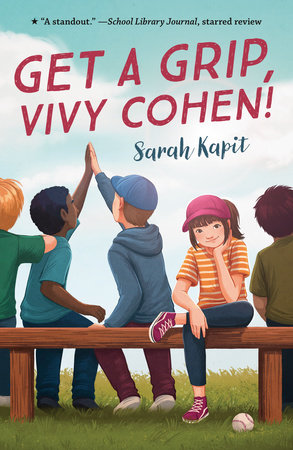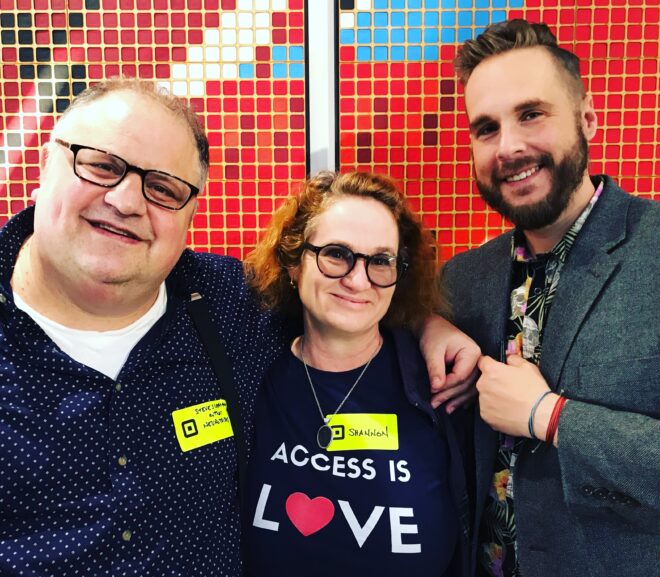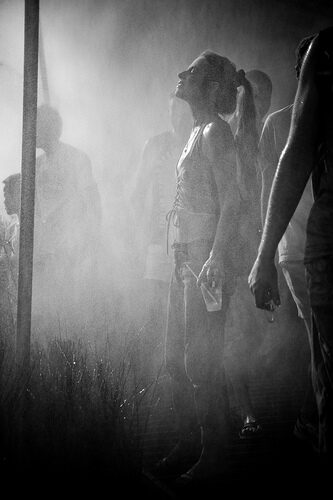Autistic author Sarah Kapit is bringing a wide range of authentic autistic characters to her readers.
Tag: autism acceptance month
“For too long autistic children have been just taught what they should do to fit in a neurotypical mold, instead of being taught who they are as autistic people, and who neurotypical people are as a neurotypical people, and how to appreciate both, and build translations between the two.”
Rainbow Clouds by RoseFireRisingCreative Commons License [image: Second Life screenshot: panels of clouds joined by a central axis, with each a different color of the rainbow.] Welcome to April, that wonderful month of northern hemisphere spring blossoms, less wonderful seasonal allergy attacks—and “Autism Awareness.” Here at TPGA, we have a long tradition of skepticism about Autism Awareness material. We are not being party-poopers; we focus on Autism Acceptance instead. Why? As we noted last year: “Acceptance means autistic people matter. Awareness just means we know autistic people exist.” We realize many who agitate for autism “awareness” are sincerely trying to do good work. But too many people hijack April to spread negative messages about autistic people, or claim that acceptance is about “complacency,” while others co-opt language that makes them look like they’re on the side of autistic people: The chest-beating gorilla of autism awareness, Autism Speaks, is making their April…
TPGA is observing Autism Acceptance Month by featuring accounts from autistic people about the differences accommodations (or lack thereof) make in their lives. Today, Finn Gardiner talks about being the “truest, best self” he can be, tackling the “politics of shame head-on,” and recognizing “that I could live with my autistic, black, queer, trans self without guilt just for being alive.” Finn Gardiner [image: Selfie of a smiling black person with shaved hair & rectangular gold-rimmed glasses.] Finn Gardiner www.expectedly.org My path to autism acceptance and rejecting the politics of shame came along with my recognition of the other intersections I experience: recognising my gender identity, fighting internalised racism, and defining and following a path that was based on my own self-determined goals — rather than what parents, professionals, and other authority figures around me deemed appropriate. My childhood and adolescence were steeped in the politics of shame. Family members…
Photo © Subconsci Productions [image: Instruments on the wall of a doctor’s exam room.] TPGA is observing Autism Acceptance Month by featuring accounts from autistic people about the differences accommodations (or lack thereof) make in their lives. Today, Kate talks about her experience trying to participate in a TMS research study, how distressing the entire scenario was for her because of the way she was treated, and how autism researchers need to better understand and accommodate autistic people if they want more autistic participants in their studies. by Kate I have figured it out, and I kind of feel like a genius. I have figured it out, and it is this: Awareness is people talking to you. Acceptance is people respecting you. Awareness is that high-pitched, baby voice. Acceptance is speaking in a normal tone. Awareness is being invited to the table. Acceptance is making sure that you can reach…
TPGA is observing Autism Acceptance Month by featuring accounts from autistic people about the differences accommodations (or lack thereof) make in their lives. Today, Amanda Forest Vivian talks about why, no, she really can’t use a phone — and how reluctant other people can be to respect and accommodate her on this matter: Design by The Dusty Phoenix [image: White iPhone case with illustrated narwhal design.] Amanda Forest Vivian adeepercountry.blogspot.com I, an adult person, do not use a phone even though I can speak orally. In fact — and I’m really letting the team down here, according to a certain kind of motivational speaker — I can’t use a phone. If you’re anything like me, you have had the idea drummed into your head that you should never use the word “can’t” unless it is literally true — not just literally because there’s nothing figurative about my inability to use…
TPGA is observing Autism Acceptance Month by featuring accounts from autistic people about the differences accommodations (or lack thereof) make in their lives. Today, British autistic filmmaker and author Carly Jones outlines her “Top five understandings previous Autistic generations did not have, that the next Autistic generation must have as standard.” Carly Jones www.facebook.com/olley.edwards Carly and her family [image: A laughing white woman with long dark hair, lying on a striped blanket with her three children.] 1) See autism as a real disability Disability is not a dirty word, though it feels that way to some — we are all too often encouraged to see disability as “less than” “inferior,” or “disadvantaged.” I see disability as someone having a different experience of the world than is “typical.” Although Theory of Mind (lack of pre-installed knowledge that other people’s thoughts, wants, and agendas may differ from one’s own) is noted as…
TPGA is observing Autism Acceptance Month by featuring accounts from autistic people about the differences accommodations (or lack thereof) make in their lives. Today, five women talk about about the under-recognition of autistic girls, the long- and short-term effects of going without supports and accommodations, and what autistic girls and actually need to succeed and be happy. Photo: Steven Depolo (Flickr) [image: Two smiling African-American girls, on a swing set.] Autism is different for girls, and not only because fewer girls than boys get autism diagnoses. Autistic women and girls tend to have different traits than autistic boys do, and are also socialized differently — leading to many of those girls being overlooked or misdiagnosed well into adulthood, plus leading most of their life without the supports that could have made their lives much easier. It gets even more complicated when autistic girls are also racial minorities, and/or from low-income…
TPGA is observing Autism Acceptance Month by featuring accounts from autistic people about the differences accommodations (or lack thereof) make in their lives. Today, John Elder Robison talks about why accommodation is important, yet may not be enough to help autistic people like him with co-occuring conditions such as anxiety. John Elder Robison jerobison.blogspot.com With April being Autism month, the folks at TPGA asked me to write about accommodations. How about anxiety, Shannon asked? Foolishly, I agreed. After thinking about the topic for hours, till smoke dribbled from my ears, I cannot conceive of any accommodation I could request around my anxiety. Photo © John Elder Robison [Image: Close up of water running over a rock in a stream.] For me, anxiety is one of the most disabling aspects of autism, and it’s with me — at least at a low level — most all the time. I am almost…
For people with sensory access needs (like reactions to scented products), accommodations are not acts of good faith or favors, they are our rights!









